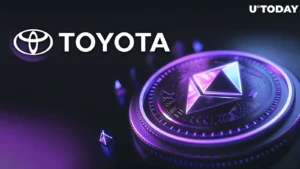Toyota, a leader in the automotive industry, is on the brink of a technological breakthrough that could redefine how we view transportation. The company is exploring the integration of Ethereum blockchain technology to create Mobility-Oriented Accounts (MOAs) for vehicles. This innovative approach could pave the way for fully autonomous cars, operating independently without human intervention.
Blockchain Digital Accounts for Cars
Imagine a world where every car has its own digital account on a blockchain. This is the vision Toyota is working towards with its MOA project. By using Ethereum’s blockchain, Toyota aims to tokenize vehicle rights and manage operations digitally. The ERC-4337 standard of Ethereum’s blockchain is at the core of this initiative, ensuring that each vehicle’s account remains secure and functional, even if the private key is lost. This feature, known as Account Abstraction, separates the authentication process from key management, enhancing both security and flexibility.

The Autonomous Driving Revolution
The ultimate goal of Toyota’s MOA project is to achieve fully autonomous driving. In this scenario, vehicles would no longer require human drivers. All driving rights and operations would be managed through blockchain technology, allowing cars to function as independent service entities. This represents a significant leap forward in autonomous mobility, bringing us closer to a future where vehicles operate seamlessly on their own.
Simplified Information Management
One of the key advantages of using blockchain technology is its ability to manage information transparently and efficiently. By leveraging Ethereum’s blockchain, Toyota can handle car-related data, such as usage history, in a more streamlined manner. This ensures that information is securely stored and easily accessible, providing a better experience for car owners and operators.
NFTs and Vehicle Access
Toyota’s initiative also includes the use of Non-Fungible Tokens (NFTs) to redefine car ownership and access. These NFTs will hold essential information about car ownership and usage rights. By linking car access to NFTs, Toyota can simplify permission control. Transferring these digital tokens will grant or revoke access, making car management more straightforward and aligning with the broader trend of digital asset usage.

The integration of blockchain technology, particularly through Ethereum, with the automotive industry represents a monumental leap forward. This cooperation brings about a future where cars are not only autonomous but also operate as independent, self-managing entities. The security, transparency, and efficiency provided by blockchain technology make this vision not just plausible, but imminent. As Toyota leads the charge, we can expect a revolutionary transformation in how we interact with and manage our vehicles, heralding an era where the synergy between car industries and blockchain technology defines the cutting edge of innovation and utility.
